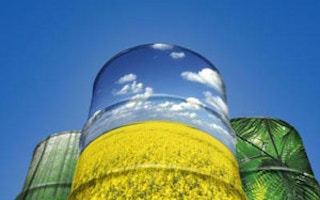Indonesian palm-based biodiesel shipments seeking a foothold in the United States will face stiff competition from feedstocks such as corn oil and waste oils, which will become cheaper as more supplies hit the market, a top USDA official said on Thursday.
Indonesian processors must also first get a clear pathway from the Environmental Protection Agency (EPA) over concerns of higher emissions arising from converting the edible oil, said Michael Dwyer, director of the U.S. Department of Agriculture’s global policy analysis division.
“The United States is frankly very competitive for biodiesel and it’s going to be hard to justify for palm oil when it costs over $900 a ton,” Dwyer told Reuters on the sidelines of the Indonesian Palm Oil Conference on Bali island.
“With 75-80 percent of cost of producing biodiesel comes from the feedstock, the market is clearly going to stick with waste oils,” he added.
Dwyer said key competition for palm-based biofuel could eventually come from corn oil as a feedstock — a waste product from distiller’s dried grains (DDGs) generated from converting corn into ethanol.
“There is appeal with corn oil. The U.S. has ethanol plants in place and the logistics have been set up years ago, so it’s a matter of extracting more value from corn through its oil,” he said.
While corn oil now costs around $1,300 a ton, a greater commitment by U.S. ethanol producers to actively use this as a feedstock for biodiesel would bring more supply to the expanding biodiesel market, bringing prices lower.
The U.S. has the potential to produce 580 million gallons of corn oil, once taking into account that some of the oil is needed to keep the substance of DDG — a valuable source of animal feed, Dwyer said.
That compares to ethanol output heading for 13.7 billion gallons this year, Energy Department data show, well above the federal mandate to use 12.6 billion gallons.
Indonesia and Malaysia, the world’s top palm oil producers, would be better placed to develop their domestic biofuel markets.
“These palm oil producers want to target external markets first where there are established mandates to grow their industries,” Dwyer said.
“That is one way of looking at it. But I think another option would be to subsidize palm-based biodiesel at the pump back home rather than fossil diesel,” he added.
Both the Southeast Asian countries control and subsidize domestic fossil fuel prices which are among the lowest in Asia. Any attempts to raise the price levels can often create a political backlash.
WTO legal
Indonesia is banking on lower export taxes for palm-based biofuel than the crude feedstock to corner more markets like Europe and the U.S. with their ambitious biodiesel mandates.
In September, the country made refined palm oil cheaper to ship out than the crude grade, stoking concerns that processors in major buying nations and competitors would see their capacity turn idle.
“It is trade distorting but its still WTO legal. Such use of export tax differentials have been on the agenda for World Trade Organization talks where there has been a call for a differential discipline,” Dwyer said.
The Doha round was launched 10 years ago with the goal of helping poor countries prosper through trade.
However, bitter divisions over how much developed countries should cut farm tariffs and subsidies in exchange for developing countries opening their markets have prevented a deal.
“We know the talks will drag on, so there is no quick solution to this,” Dwyer said.
“The Indonesians are doing exactly what the soy-exporting Argentineans did years ago, they want to supply higher value products to create jobs and investments.”










